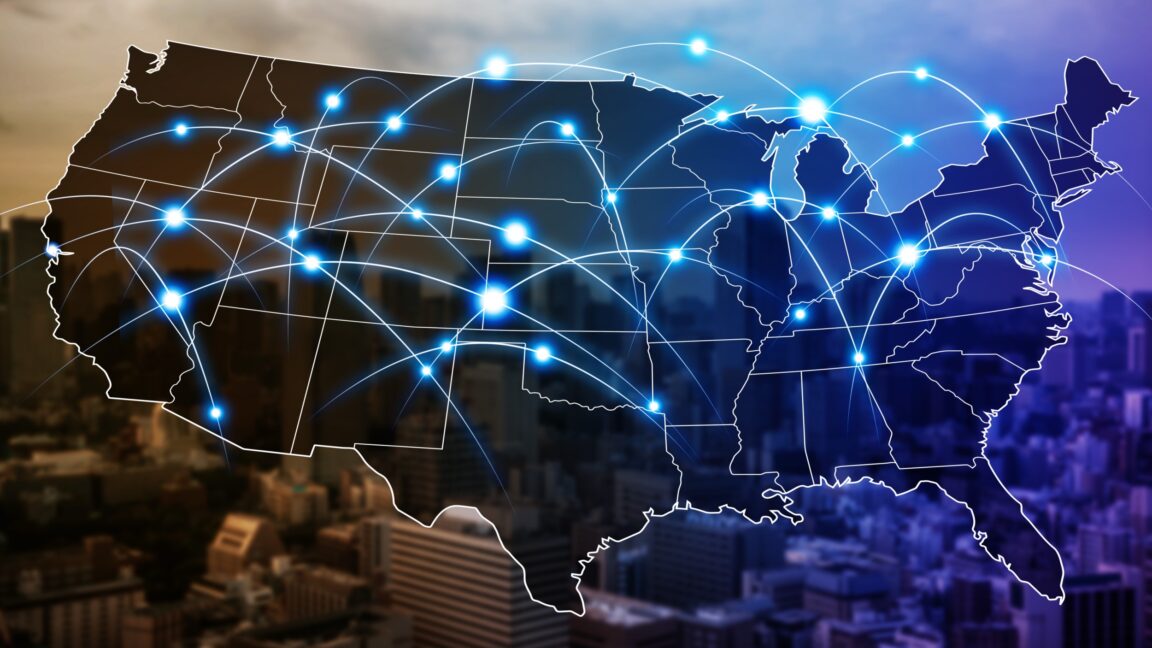ISPs vs. cheap broadband
After Supreme Court loss, ISPs ask Trump admin to block state affordability laws
New York mandates $15 low-income plans; other states may impose similar laws.
Text
settings
Broadband lobby groups asked the Trump administration to block state laws that require Internet service providers to offer cheap plans to people with low incomes. The biggest lobby groups for the cable, telecom, and mobile industries made the request in a filing with the US Department of Justice this week.
The groups want Trump’s Justice Department to sue states such as New York, which requires ISPs to offer broadband for $15 or $20 a month to people who meet income eligibility requirements. “The Antitrust Division should work with other components of the Department of Justice to consider bringing affirmative preemption litigation against the harmful state laws already on the books or soon enacted—particularly those that directly regulate broadband rates,” the lobby groups said.
The lobby groups also said the Justice Department should collaborate with the Federal Communications Commission “to thoroughly examine every possible tool in the federal government’s toolbox, including any and all ways in which the Commission can take regulatory action to preempt harmful state regulations.” The filing was submitted by CTIA-The Wireless Association, NCTA-The Internet & Television Association, and USTelecom-The Broadband Association.
The groups made the submission to the Justice Department’s new Anticompetitive Regulations Task Force, which it created “to advocate for the elimination of anticompetitive state and federal laws and regulations that undermine free market competition and harm consumers, workers, and businesses.” The Trump administration task force asked for public comments on state and federal laws that should be eliminated.
A Justice Department lawsuit against states wouldn’t necessarily get ISPs what they want. The lobby groups already sued New York themselves and lost in a federal appeals court. The Supreme Court refused to hear the groups’ challenge in December 2024 and rejected a follow-up request by the ISPs in February.
Potential wave of state laws
New York’s law requires ISPs with over 20,000 customers in the state to offer $15 broadband plans with download speeds of at least 25Mbps, or $20-per-month service with 200Mbps speeds. ISPs feared that their court loss would lead many other states to impose similar requirements, and some states are now considering legislation modeled on New York’s.
A California bill would require $15 plans with download speeds of 100Mbps and upload speeds of 20Mbps. The broadband lobby groups’ filing said ISPs are also worried about “unnecessary anticompetitive regulations” proposed in Connecticut, Hawaii, Maine, Maryland, Massachusetts, Minnesota, Pennsylvania, Rhode Island, Vermont, and West Virginia.
Not all the pending state bills are specifically about prices charged to low-income users. Some would impose net neutrality requirements or classify ISPs as utilities, the filing said.
Preempting state laws while simultaneously avoiding federal regulation has been a long-held dream for the broadband industry. During the first Trump administration, then-FCC Chairman Ajit Pai led a vote to eliminate the FCC’s net neutrality rules and preempt all 50 states from passing their own net neutrality laws. But the FCC’s broad preemption attempt failed in court.
When challenging the New York affordability mandate, ISPs claimed the state law was preempted by the Pai FCC’s decision to deregulate broadband. But this argument failed for the same reason that Pai’s earlier preemption attempt failed—the FCC decision to deregulate removed the FCC’s strongest regulatory authority over broadband, and courts have ruled that the FCC cannot preempt state laws in an area that it is not regulating.
The Pai FCC’s “order stripped the agency of its authority to regulate the rates charged for broadband Internet, and a federal agency cannot exclude states from regulating in an area where the agency itself lacks regulatory authority,” the US Court of Appeals for the 2nd Circuit said in the ruling that upheld New York’s law last year.
ISPs keep making same argument
ISPs still aren’t giving up on the argument, as they hope a court might someday rule differently. The lobby groups’ filing reminded the Department of Justice that during the first Trump administration, the government brought a preemption suit against California’s net neutrality law.
“The Department unfortunately dropped out of the litigation after the change in Administration,” the filing said. “But as then-Attorney General [Jeff] Sessions explained in initiating the action, California had ‘enacted an extreme and illegal state law attempting to frustrate [the] federal policy’ of an unfettered market for broadband, and the Justice Department had a ‘duty to defend the prerogatives of the federal government and protect our Constitutional order.'”
ISPs kept challenging the California net neutrality law well into the Biden administration but couldn’t find any judges who would vote to overturn it. They say the wave of state legislation currently under consideration would be more harmful to their businesses than California’s net neutrality law.
“Many of the state laws that are now being enacted are far more intrusive than the California law the Department challenged in 2018. These new state broadband regulations are flatly illegal under established preemption principles,” the filing said.
No specific preemption law
With multiple federal courts having ruled that the state laws are not preempted by existing US laws and regulations, ISPs’ best chance at preemption is probably for Congress to implement a nationwide preemption law.
ISPs claim that states are defying Congress’ will as specified in the Telecommunications Act of 1996, which said that it “is the policy of the United States… to preserve the vibrant and competitive free market that presently exists for the Internet and other interactive computer services, unfettered by Federal or State regulation.”
ISPs told the Justice Department that this was “an intentional and preemptive decision by Congress to embrace the free market” that is now being thwarted by states “adopt[ing] their own utility-style regulations of broadband.” But the ISPs’ filing doesn’t point to any US law that would specifically preempt the New York affordability mandate or similar proposals being considered in other states.
Even if the US doesn’t bring lawsuits against states that impose new mandates on broadband providers, the industry itself will continue to file such cases. The lobby groups’ filing asked the Justice Department to support those lawsuits even if the Trump administration doesn’t file any itself.
“The Department should defend Congress’s carefully calibrated judgment that the Internet ‘has flourished,’ and will continue to flourish ‘to the benefit of all Americans, with a minimum of government regulation,'” the filing said. “At a minimum, if the Department does not ultimately decide to pursue litigation itself, it should support challenges by industry through amicus briefs or statements of interest.”


